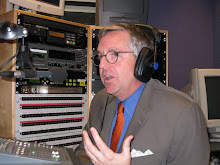
President Barack Obama had his first Head of State visit yesterday. The first head of state to visit the new President is Prime Minister Gordon Brown. The man expected to save the world meets the man “saving the world” as Mr Brown so famously said in PMQs.
Whether the “special relationship” will be as close and intimate as Bush/Blair remains to be seen, but it will certainly remain important. There is little fun or touring on the menu. The main course is of course economy and banking regulation with a dessert of climate change and the Middle East.
In addition to the meeting with the President at The White House, the Prime Minister is addressing a joint-session of Congress. The Prime Minister is also making numerous press appearances carrying the message of tightening international banking regulations to prevent further collapse of the global financial system.
While the Prime Minister is doing exclusive interviews on national television and radio programs and media availability, he is not providing any exclusive interviews with West of the West Wing today. No visit to Sacramento, no pint at The Fox and Goose on R Street…go figure!
The Prime Minister’s interview on National Public Radio’s program, “Morning Edition” is available here.
The Prime Minister arrived on a very dismal day for the American economy with the Dow Jones closing Monday at a low of 6763.29 and the announcement this morning of a second federal bailout for the floundering financial giant, American International Group (AIG). Meanwhile, across the pond the furore over Sir Fred Goodwin’s pension continues and increasingly resembles a Salem witch hunt.
Prime Minister Brown’s visit, being the first by a visiting Head of State for President Obama, is another symbolic gesture and connection between America and its core allies. President Obama’s first international visit was to Canada and now his first visitor is from the United Kingdom. Prime Minister Brown’s comments, beyond the focus of the global banking system and the need for an international approach to stabilizing it, is also on the traditional subject of the continued importance of “the special relationship” between the UK and the US.
Of course, First Minister Alex Salmond was in the US last week and I am not sure how much of his discussion with Secretary of State Clinton will be shared with the Prime Minister. The latter’s visit will certainly receive more media attention.
From this side of the Atlantic, it is hard to see how much of this visit by the Prime Minister is about his own political objectives as much as it is to advance the upcoming London Summit 2009 in April. Photo opportunities and television time with the internationally popular President can’t hurt, which is exactly the line many U.K. commentators are taking.
The comparison many are making is historical: a President Bush struggling domestically in the polls needing the backing of a popular Prime Minister Blair (in the U.S. that is). Undeniably, there’s hope of an ‘Obama bounce’.
For President Obama, it is a golden opportunity to demonstrate his commitment to diplomacy and to his international philosophy that the US should be working with the nations of the world, not dictating the needs of the US and expecting everyone to jump.
Debates, rumors and counter-rumors are in full flow. Yet the magnitude of this visit cannot be underestimated nor should it be overlooked with many perceiving this as nothing more than a unique PR opportunity.
The free-market orthodoxy that drove globalisation is over. It is clear, indeed it has been clear to many for some time, that the ‘rising tide does not lift all sailboats’ as Joseph Stiglitz so memorably put it. The ideological strait-jacket can be placed on a coat-hanger. In its place, Brown and Obama (and countless others) must begin to forge a global financial architecture that does not simply adhere to a ‘Bretton Woods’ logic.
The Prime Minister is correct – this is not a time to return to protectionism. This does not mean, however, a return to neo-liberal economics. Reminiscent to Keynes’ visit to the U.S. in 1944, Brown and Obama must begin to forge a new ‘global bargain’ that is more just, more transparent and more ecologically sound.
Chuck Dalldorf & Barry McCulloch

Chuck I agree with your assertion that this is a time to drive a new global bargain. For the USA and the UK in particular, it is a no-brainer that they can and should lead on this as a powerful tool for the way out of recession. I have been revisiting recently about how important (and now little appreciated) a part that environmental and heritage initiatives played in the Roosevelt New Deal. Many elements such as the 3 million strong 'Tree Army', the log cabin camping sites and even 'hard' public infrastructure projects such as San Francisco Zoo, were all to do with the natural environment, heritage and leisure and quality of life.
ReplyDeleteThese are important facts to employ against the siren voices who would now tell us that the environment and quality-of-life are all very well but it is again all about 'the economy stupid'. In fact these are all interrelated - indeed they are all inter-dependent.
Regards
Edward Harkins
Glasgow, Scotland
Hi Edward:
ReplyDeleteThanks for your insightful comments and thoughts, especially the reflection on what President Roosevelt did in The New Deal as far as the diversity of federal investment in a number of areas, including art! And yes, your great comment is the point - the investments we need to make should stretch much further than infrastructure only.
The environment is a driver in jobs creation and, as you point out, is not separable and completly interdependent with every other aspect of what we do.
Best wishes and thanks for your comments and thoughts!
Chuck